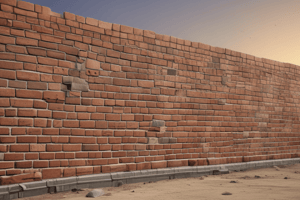Podcast
Questions and Answers
Which type of mortar is characterized by a mixture of cement, sand, and water?
Which type of mortar is characterized by a mixture of cement, sand, and water?
- Lime mortar
- Natural mortar
- Cement mortar (correct)
- Cement-lime mortar
What is a key disadvantage of using lime mortar in masonry construction?
What is a key disadvantage of using lime mortar in masonry construction?
- Low compressive strength (correct)
- High cost of materials
- Fast setting time
- High water retentivity
Which mortar type enhances plasticity and water retention by adding lime to cement mortar?
Which mortar type enhances plasticity and water retention by adding lime to cement mortar?
- Cement mortar
- Masonry mortar
- Lime mortar
- Cement-lime mortar (correct)
Structural clay tile is categorized under which type of masonry unit?
Structural clay tile is categorized under which type of masonry unit?
What are the components of mortar used as a bonding agent in masonry construction?
What are the components of mortar used as a bonding agent in masonry construction?
What is a primary feature that distinguishes reinforced masonry walls from unreinforced masonry walls?
What is a primary feature that distinguishes reinforced masonry walls from unreinforced masonry walls?
Which type of masonry wall is constructed with an internal air space between two wythes?
Which type of masonry wall is constructed with an internal air space between two wythes?
What characteristic makes masonry walls highly efficient in compression?
What characteristic makes masonry walls highly efficient in compression?
What is a benefit of constructing masonry walls with modular building blocks?
What is a benefit of constructing masonry walls with modular building blocks?
Which of the following describes a primary function of metal wall ties in unreinforced masonry walls?
Which of the following describes a primary function of metal wall ties in unreinforced masonry walls?
Flashcards are hidden until you start studying
Study Notes
Masonry Walls
- Masonry walls are constructed using modular building blocks bonded with mortar.
- Benefits include durability, fire resistance, and structural efficiency in compression.
- Types of masonry walls: solid walls, cavity walls, and veneered walls.
Types of Masonry Walls
- Unreinforced masonry walls: Also known as plain masonry; may include horizontal joint reinforcement and metal wall ties.
- Reinforced masonry walls: Feature steel reinforcing bars embedded in grout-filled joints, enhancing stress resistance.
- Common masonry units include structural clay tile, structural glass block, natural stone, cast stone, and brick.
Masonry Units
- Bricks: Heat-hardened clay units.
- Concrete blocks: Chemically hardened units.
- Glass blocks: Provide aesthetic and light-transmitting properties.
- Structural clay tiles: Used for both wall and structural applications.
Mortar
- Mortar is a mixture of cement or lime, sand, and water, functioning as a bonding agent.
- Types of mortar:
- Cement mortar: Portland cement mixed with sand and water.
- Lime mortar: Mixture of lime, sand, and water; seldom used due to slow hardening and lower strength.
- Cement-lime mortar: Cement mortar augmented with lime for improved plasticity and water retention.
Specific Terms
- Wythe: A vertical section of a wall consisting of one masonry unit in thickness.
- Grout: A liquid mixture of mortar that can be poured or pumped into joints; used to fill voids in masonry and foundations.
Studying That Suits You
Use AI to generate personalized quizzes and flashcards to suit your learning preferences.




